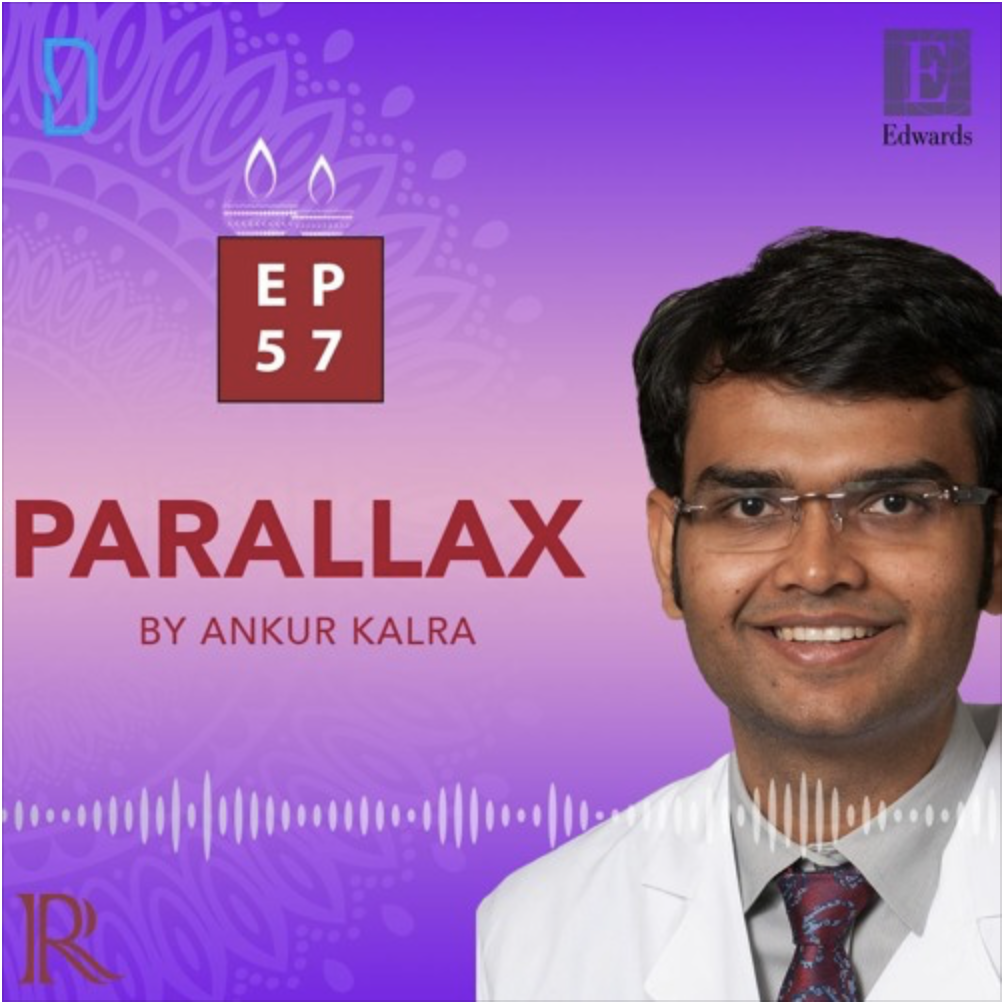
Dr. Pandey, a recipient of multiple awards, thinks about himself as a person driven by curiosity rather than passion. He believes that his interest in solving problems helped him to navigate successes and failures as an early-career researcher.
In celebration of Diwali, Dr. Ankur Kalra sat down with Dr. Ambarish Pandey, Assistant Professor at The University of Texas Southwestern Medical School, to talk about his career path and the questions that shaped his decision-making over the years.
In this candid and insightful interview, Ambarish talks about his training in India and the factors that contributed to his decision to continue his work in the US. He shares how preparing for a journal club led him to studying novel epiphenomenon in large data sets, as well as the practical aspects of applying for funding and developing questions.
What is the meaning of success and failure in academic medicine? What are the questions that guide Dr. Pandey? What does he consider key for his success in academic career? What is his message for our listeners?
Questions and comments can be sent to “podcast@radcliffe-group.com” and may be answered by Ankur in the next episode. Guest @ambarish4786, hosted by @AnkurKalraMD. Produced by @RadcliffeCARDIO.

Brought to you by Edwards: www.edwardstavr.com
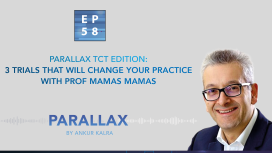
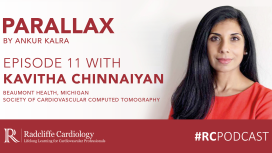
In the final episode of our burnout and resilience series, Kavitha and Ankur give you some practical tools of self-care to help you avoid burnout. Kavitah Chinnaiyan, MD, is an award-winning author and, Cardiologist and Director of Cardiac CT Research at Beaumont Health, MI. Send us your thoughts to this episode for Ankur to share in future episodes: podcast@radciffe-group.com. Guest @ChinnaiyanMD.
Hosted by @AnkurKalraMD. Produced by @RadcliffeCARDIO.
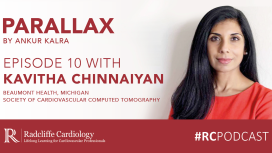
In our second episode on burnout and resilience, Kavitah Chinnaiyan, MD, and Ankur take a deeper dive into mindfulness and training the brain to move from Default-Mode to Task-Positive Networks. Kavitah is an award-winning author and, Cardiologist and Director of Cardiac CT Research at Beaumont Health, MI. Send us your thoughts to this episode for Ankur to share in future episodes: podcast@radciffe-group.com. Guest @ChinnaiyanMD.
Hosted by @AnkurKalraMD. Produced by @RadcliffeCARDIO.
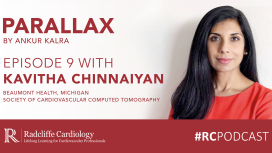
Hosted by @AnkurKalraMD. Produced by @RadcliffeCARDIO.
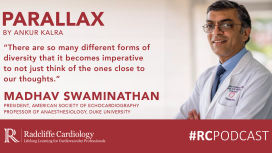
Ankur and Madhav also discuss positive traits of leadership, why we should embrace failure and the importance of mentorship throughout all stages of one’s medical career. Send us your comments to this episode for Ankur to share in future episodes: pocast@radciffe-group.com. Guest @mswami001.
Hosted by @AnkurKalraMD. Produced by @RadcliffeCARDIO.
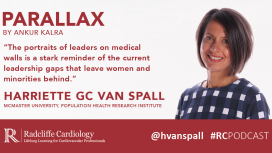
Harriette is an Associate Professor of Medicine at the Department of Medicine, Cardiology and the Department of Health Research Methods, Evidence and Impact at McMaster University and the Population Health Research Institute in Hamilton, ON, Canada. In this episode, Ankur and Harriette discuss why this issue is so contentious, what the current state of medical walls represents, why this may be an issue and what alternative medical walls could look like. Harriette also shares her thoughts on how this topic relates to the maintenance of hierarchical power structures in academic institutions, calling for more collaborative leadership and management styles. Guest @hvanspall.
Hosted by @AnkurKalraMD. Produced by @RadcliffeCARDIO.

In this episode, Ankur and Danielle speak about the evidence in favour of a whole-food plant-based diet to improve cardiovascular health, the ACC prevention guidelines, how to talk to patients about positive dietary change, the issue of lack of nutrition training in cardiovascular fellowships and what Danielle’s diet looks like as a busy whole-food plant-based cardiology fellow. On her own podcast ‘Nutrition Rounds’ Danielle has discussions about evidence-based plant-based nutrition with physicians who are leading experts in nutrition and health.
Hosted by @AnkurKalraMD. Produced by @RadcliffeCardiology.

In this brilliant conversation, Ankur, Emmanouil and Michael unravel the potential advantages, challenges and practical realities of using drug-coated balloons in SVD, and the findings of the latest randomised controlled trials studying this area.
Hosted by @AnkurKalraMD. Produced by @RadcliffeCardiology. [Disclaimer: The use of drug-coated balloons in coronay intervention is still off-label; it has not been approved by the FDA.]

Dawn is an associate editor of the journal Circulation: Cardiovascular Interventions and is widely known for her research program on PCI and peripheral arterial disease (PAD). Ankur and J. Dawn discuss multiple trials/studies that were published in 2018, including ORBITA, PIONEER-II and ABSORB. J. Dawn also shares her thoughts on the latest stent technologies.
Hosted by @AnkurKalraMD. Produced by @RadcliffeCardiology.

They discuss the importance of preventative medicine, their experience of reducing hypertension with non-pharmaceutical and pharmaceutical methods, and the significance of the integrated “team approach” when treating comorbid conditions such as hypertension. Athena also shares her thoughts on cardiologists’ responsibility to shape their patients’ lifestyle choices.
Hosted by @AnkurKalraMD. Produced by @RadcliffeCardiology.

Chest pain is one of the most common reasons for an emergency room visit in the US, with almost 6 million ER visits annually, yet there is no consensus on how to compare the results from various hscTn assays. Tune in to hear Santiago outline the advantages and limitations of using hscTn as a standard biomarket to evaluate patients with suspected ACS in the ER.
Hosted by @AnkurKalraMD. Produced by @RadcliffeCardiology.

The charity organisation, Women as One is an agent for women and men to be part of medicine that is built on talent, rather than a privilege. Roxana and Ankur discuss the role of mentorship and family-friendly work environment in mending the broken house of cardiology. Roxana talks about the practical tools that are available for women to take the next steps in their career and achieve their goals.

Dr Kalra asks Dr Mauri about early influences and her traineeship with legendary interventionalists, the late Donald Baim and Richard Kuntz. Dr Mauri talks openly about her decision-making process and the importance of selecting your priorities and committing to them. Ankur asks Laura about her decision to go into industry. Laura shares her thoughts on medical innovations and meeting urgent needs with unique perspectives.
What is Dr Mauri’s advice for a young cardiologist? How did she balance research and patient care? What are the questions that helped her decision making? How does Dr Mauri think about innovations in medicine?

Brigham and Women’s Hospital’s Health Equity Committee decided to confront the status quo by asking: How is racism on a structural level present within our walls?
Ankur Kalra’s guests Michelle Morse (Founding Co-Director of EqualHealth and Assistant Professor at Harvard Medical School) and Lauren Eberly (Cardiology Fellow at the University of Pennsylvania) are co-authors of a retrospective study that demonstrated what had previously only been observed: That black or brown heart failure patients ended up in general medicine rather than specialised cardiology services. Following the publication of the study in November 2019, the Health Equity Committee started to roll out anti-racism trainings and to work on objective admission guidelines to mitigate biased behaviours.
Aarti Bhatt (Assistant Professor of Medicine at the University of Minnesota), member of the Minnesota chapter of Campaign Against Racism, talks about their initiative to support projects that have a positive impact on local communities on a global scale.

In this week’s Parallax, Dr Kanaa’N, the director of the program, and Dr Lahorra, chairman of the Heart, Vascular & Thoracic Department of Akron General introduce the listeners to the foundations of their program and the paradigm shift brought by TAVR.

Ankur Kalra asks Grant W Reed, Director of the Cleveland Clinic’s STEMI program, to reflect on the actions they took and the challenges of delaying cardiovascular procedures in the wake of the coronavirus pandemic. Dr Reed offers insight on the factors that influenced the Cleveland Clinic’s STEMI policy for COVID-19. Ankur and Grant discuss the triage considerations for patients with structural heart disease and the steps the clinic took to protect its healthcare workers.





